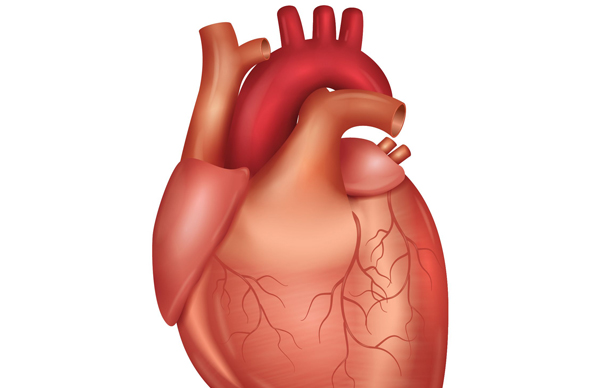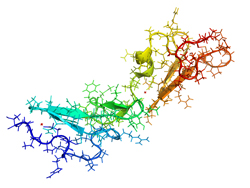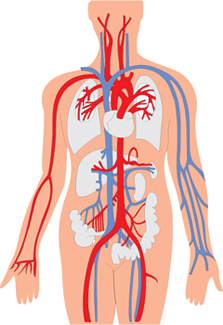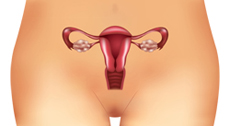
Homocysteine Levels and Heart Disease Risk
 Homocysteine is an amino acid that can build up in your bloodstream and contribute to heart disease risk.1 Since women with polycystic ovarian syndrome (PCOS) already have an increased risk for heart disease, high homocysteine levels can compound the risk of developing cardiovascular disease. High homocysteine levels increase the risk of artherosclerosis, the narrowing and hardening of arteries, and can increase the risk of blood clots that lead to heart attacks and strokes.1
Homocysteine is an amino acid that can build up in your bloodstream and contribute to heart disease risk.1 Since women with polycystic ovarian syndrome (PCOS) already have an increased risk for heart disease, high homocysteine levels can compound the risk of developing cardiovascular disease. High homocysteine levels increase the risk of artherosclerosis, the narrowing and hardening of arteries, and can increase the risk of blood clots that lead to heart attacks and strokes.1
Women with PCOS are more likely than women without polycystic ovarian syndrome to develop metabolic syndrome, a cluster of conditions that raise the likelihood of developing cardiovascular disease.1 In fact, many classic PCOS symptoms and conditions associated with polycystic ovarian syndrome could be said to be symptoms of metabolic syndrome. These PCOS symptoms and conditions include insulin resistance, obesity, high blood pressure, and high cholesterol levels.1 High homocysteine levels are also associated with hyperinsulemia, a high blood insulin level common in women with polycystic ovarian syndrome that is linked to insulin resistance.1
A number of studies have found that women with PCOS tend to have high homocysteine levels, among them, a 2009 study published in the Journal of Reproduction & Infertility.2 The researchers compared 54 women with PCOS to 104 women without PCOS.2 The researchers measured homocysteine levels, folic acid, insulin, and triglyceride levels among the women during their menstrual cycle.2 The study found that homocysteine levels are influenced by folic acid levels in women with PCOS. 2 The authors surmise that dietary supplementation, especially folic acid, can help lower homocysteine levels among women with polycystic ovarian syndrome and so lower the risk of cardiovascular disease.2
This is great news if you suffer from PCOS because the best treatment for polycystic ovarian syndrome and PCOS symptoms is a natural approach: lifestyle changes in terms of behavioral habits, diet, exercise, and nutritional supplements.
+ Click here to learn about the all natural PCOS 5-Element Solution
+ Click here to read more articles about PCOS and Hormones
Causes
What Causes High Homocysteine Levels?
Homocysteine is an amino acid most often produced by the breakdown of meat you ingest. Homocysteine is normally converted to the amino acids cysteine and methionine. This process occurs when adequate amounts of folic acid, vitamin B6, and vitamin B12 are present. If these nutrients aren’t present in sufficient amounts, then homocysteine isn’t converted and it builds up in your bloodstream.3
High homocysteine levels are usually caused by nutritional deficiencies, but in some cases genetic factors can contribute to the condition.3 Homocystinuria is a genetic disorder in which the essential enzymes used to break down homocysteine are lacking or present in too-low amounts. In other genetic conditions, molecules that aid in homocysteine breakdown are inefficient so homocysteine levels build up in the bloodstream.3
Usually, it’s deficiencies of folate, vitamin B6, and vitamin B12 that lead to elevated homocysteine levels.3 Cigarette smoking and chronic kidney disease can cause these deficiencies.3
Symptoms
What are the Symptoms of Elevated Homocysteine Levels?
A high homocysteine level is thought to contribute to the hardening and narrowing of the arteries (artherosclerosis) and the formation of blood clots that can lead to deep vein thrombosis and pulmonary embolisms.3 This blood clotting tendency can obstruct blood flow and contribute to increased risk for heart attack and stroke.3
According to NYU Langone Medical Center, scientists used to believe high homocysteine levels played a causal role in increased heart disease risk, especially in terms of artherosclerosis.4 Today, they understand that while high homocysteine levels, can contribute to cardiovascular disease, lowering homocysteine levels doesn’t seem to lower heart disease risk.4
levels played a causal role in increased heart disease risk, especially in terms of artherosclerosis.4 Today, they understand that while high homocysteine levels, can contribute to cardiovascular disease, lowering homocysteine levels doesn’t seem to lower heart disease risk.4
Several small and large-scale studies have been done in which researchers lowered homocysteine levels to study the effect on heart disease risk.4
Five different studies comprised of over 18,000 people utilized vitamin B supplements and folate to lower homocysteine levels, and none of them found a clear decreased risk for cardiovascular disease.4
While high homocysteine levels have been linked to a number of conditions and diseases such as Alzheimer’s disease, osteoporosis, pregnancy complications, pulmonary embolism, and now PCOS, studies have not been able to show that lowering homocysteine levels reverses any of these conditions.4 If they did, a definite causal relationship could be established. Instead, it seems that high homocysteine levels contribute to increased heart disease risk and that other factors influence this contribution.
A number of studies have looked at the link between PCOS and homocysteine levels.
- A 2003 study published in Human Reproduction compared 155 infertile PCOS women with 100 infertile women without polycystic ovarian syndrome. It was discovered that 53.5 to 65.8 percent of the women with PCOS had insulin resistance and that high homocysteine levels seemed to accompany insulin resistance regardless of whether the women were slim, overweight, or obese.5
- A 2011 study published in the Iranian Journal of Reproductive Medicine also found a link between insulin resistance and homocysteine levels in women with PCOS.6 The researchers found that women with polycystic ovarian syndrome had high homocysteine levels as compared to women without PCOS. They also found the PCOS women with insulin resistance had much higher homocysteine levels than the PCOS women without insulin resistance.6 The study authors theorize that insulin resistance contributes to high homocysteine levels and that high androgen levels in women with polycystic ovarian syndrome seems to play a role in both insulin resistance and high homocysteine levels.6
Treatment Options
Are There Medical Treatment Options?
There is not a specific drug formulated to reduce homocysteine levels. If you have polycystic ovarian syndrome, however, you should know about the link between insulin sensitizers and elevated homocysteine levels.
Metformin is an insulin-sensitizing drug often used to treat insulin resistance in women with PCOS. Insulin sensitizers reduce insulin resistance and can help regulate androgen  levels in women with polycystic ovarian syndrome.
levels in women with polycystic ovarian syndrome.
Unfortunately, Metformin can raise homocysteine levels.7 Studies have found that Metformin increases homocysteine levels in men with cardiovascular disease, and that Metformin along with insulin therapy lowers levels of folic acid and vitamin B12, raising homocysteine levels in people with Type 2 diabetes.7 Studies have also recorded increases in homocysteine levels in women with PCOS who take Metformin.7
Turkish researchers conducted two studies, one in 2004 and one in 2005, investigating insulin-sensitizing drugs and their effect on women with PCOS.7,8 In one study, the researchers used folate and B vitamins to lower homocysteine levels in women with PCOS who were taking Metformin.7 One group of women with PCOS took Metformin for 12 weeks and the other PCOS group took Metformin along with folate and B vitamins.7 With Metformin alone, homocysteine levels rose by 26.5 percent in the PCOS women. In the PCOS women who took folate and B vitamins, homocysteine levels decreasedby 8.33 percent.7
The second study compared the effects of Metformin and the insulin sensitizer Rosiglitazone on homocysteine levels in women with polycystic ovarian syndrome.8 The scientists studied 30 PCOS women for three months, half on Metformin and half on rosiglitazone.8 Homocysteine levels rose from 8.93 molecules per liter to 11.26 in the PCOS women on Metformin, and from 10.7 molecules per liter to 12.36 in the PCOS women on Rosiglitazone.8
Natural Therapies
Getting to the Core of the Problem
The best response to elevated homocysteine levels is diet. Eating foods that contain folic acid, vitamin B6, and vitamin B12 or taking nutritional supplements of these nutrients can help lower homocysteine levels in women with PCOS. You should always consult a registered dietician or doctor before taking nutritional supplements because they can interact with certain conditions and medications.
folic acid, vitamin B6, and vitamin B12 or taking nutritional supplements of these nutrients can help lower homocysteine levels in women with PCOS. You should always consult a registered dietician or doctor before taking nutritional supplements because they can interact with certain conditions and medications.
Although clinical studies are still underway, observational studies do suggest that folic acid and B vitamins can reduce homocysteine levels.3 In one study, women who took folate had better cardiovascular health than women who didn’t.3
Regardless of homocysteine levels, losing weight, exercising, and lowering blood pressure and cholesterol levels can all lower your risk of developing cardiovascular disease or having a heart attack or stroke, 3 along with reducing other PCOS symptoms. Since women with PCOS already have higher heart disease risk, lifestyle changes can make a big difference in your quality of life and life expectancy.
Good sources of folic acid are avocados, beans, broccoli, eggs, fruits, leafy greens, liver, peas, tomatoes, and wheat germ.9 Vitamin B6 can be found in bananas, beef, bulgur, chicken, chickpeas, cottage cheese, liver, nuts, onions, raisins, salmon, spinach, tofu, tomatoes, tuna, turkey, and watermelon.10 Get vitamin B12 from beef, dairy products, and fish.11
Trimethylglycine is a nutritional supplement that is used to lower extremely high homocysteine levels in people with genetic disorders such as homocystinuria but it can raise cholesterol levels.4
Phosphatidylcholine is a compound found in eggs, mustard, soybeans, and sunflowers that can prove helpful in lowering homocysteine levels.4
In addition to eating healthy foods, exercise can help you lower homocysteine levels, lose weight, reduce insulin resistance, and lower heart disease risk. A 2002 study published in the Journal of Clinical Endocrinology and Metabolism found that exercise alone significantly lowers homocysteine levels in women with PCOS.12
+ Click here to order the PCOS 5-Element System
+ Click here to read more articles about PCOS and Hormones
Next Steps
- Take the PCOS Quiz! Get your score and assess your hormone health risks.
- Join our Facebook Sisterhood Group Pose your questions to this group of like-minded women. Get the answers to your questions and the support you need.
- Checkout the Hormone Reset. Guided Practices to eliminate anxiety, lose weight and boost energy.
We are committed to helping women reverse their symptoms of hormone imbalance – a major cause of excess weight gain, adult acne, unwanted facial hair, depression, anxiety, and heartbreaking female infertility.
©Insulite Health empowers women with hormone imbalance to transform their lives through a process of healing with the Natural Hormone Solution –a complete solution for helping women reverse the symptoms hormone imbalance..
